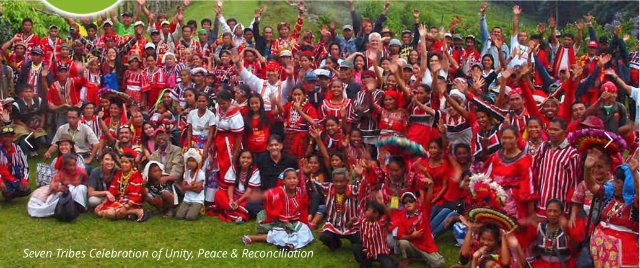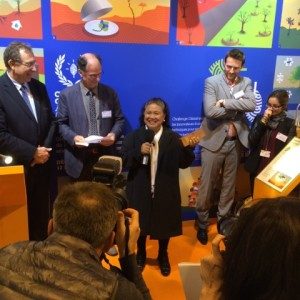SUMMARY
This is AI generated summarization, which may have errors. For context, always refer to the full article.

This is a press release from the Hineleban Foundation:
MANILA, Philippines – Serendipitously, just as French President Francois Hollande was ending his first official visit to the Philippines in late February 2015, a Filipino NGO, Hineleban Foundation, was recognized in France for its work in addressing climate change in the Philippines.
Heneleban is a social development organization working on Mindanao. It won the Grand Prize for Best Project in the Forestry Sector at an International Competition on Climate Change in Paris, which was organized by the French Development Agency and the Agricultural Research Centre for International Development.
The competition drew 550 entries from 60 countries all over the world; it aims at promoting technology and knowledge as essentials in the solutions for the future impact of agriculture and forestry on climate change.
Harmony, peace
Hineleban’s “Raison D’etre” is to renew the cycle of life and revitalize the promise of Mindanao. It is involved in reviving ecosystems, enhancing shared values, and transforming communities for greater prosperity in Mindanao.
The foundation’s goal is to create an environment where there is harmony and peace. It aims to preserve the sanctity of nature’s gifts.
What differentiates the foundation from others is the depth of the relationships they developed with their communities. It also has a holistic approach in its work in conservation, livelihood, and sustainable development.
The Philippines was covered with virgin forest, thriving with wildlife, clean rivers, and creeks. In the last 4 decades, however, the forests are almost wiped out. The province of Bukidnon and Lanao del Sur are lucky to still have a portion of its primary forest left, but they are still vulnerable to threats posed by global warming.
Due to climate change, two strong typhoons – Sendong in 2011 and Pablo in 2012 – passed through the island and claimed thousands of lives, destroyed hundreds of houses, bridges and roads, and devastated thousands of hectares of agricultural and industrial crops.
During the recent visit of Hollande, to the Philippines, France and the Philippines inked several agreements for cooperation areas. Topping this list is the “Declaration of Intent” of both countries to protect the environment and to sustainably develop marine resources.
Hineleban

Hineleban’s program highlights efforts to advance rainforestation. Hineleban implemented the Mindanao Reforestation Initiative through its Program for Equitable Advancemenf of Rural Livelihood (PEARL), which was developed in close collaboration with the province of Bukidnon and the Sangguniang Panlalawigan (Provincial Board).
PEARL which was launched in September last year aims to rehabilitate denuded forests in the 6 mountain ranges in Bukidnon and Lanao del Sur.
Hineleban also pioneered the use of a nurse crop called Caliandra for rainforestation. Caliandra helps in regenerating eroded soils and facilitating the control of natural grass fires by providing a shaded canopy that blocks sunlight from entering the forest floors, thus preventing grasses like cogon and talahib from growing.
The University of the Philippines is now documenting the success stories of Caliandra and expects to publish its findings in the near future.
The NGO also has a project on coffee growing, in partnership with the indigenous peoples (IPs) of Bukidnon. It directly engages the IPs from the production, harvest, processing, and marketing.
Through this initiative, the IPs are able to earn a decent income from the sharing of revenues earned from the sale of coffee. Hineleban calls this a “Transformational Business Partnership.”
The “Sip and Reforest” slogan is another unique feature of the coffe model. For every coffee bag bought, Hineleban plants a forest tree which is geotagged and given a number so you can see your tree grow through google maps on Hineleban’s website.
Rehabilitation, livelihood
Another initiative is the Enhanced National Greening Program focuses on the rehabilitation of highly degraded forests. It aims to complement the National Greening Program of the Department of Environment and Natural Resources (DENR).
Hineleban also has 3 livelihood programs: The production of Arabica coffee, the planting of giant bamboo in gullies and riparian zones, and the distribution of tissue-cultured abaca.
The ultimate goal of providing livelihood to the IP communities is to mitigate the effects of climate change through reforestation. The IPs are provided with livelihood so they will stop cutting trees for a living, thus reducing deforestation.
Hineleban has been implementing the Special Program for Indigenous Peoples. It aims to protect the remaining forests and restore the critical watersheds in Bukidnon and Lanao del Sur.
The IPs in the ancestral lands within the buffer zones of the 4 mountain ranges of Bukidnon were destitute, without any food or any livelihood to fend for themselves. Because of this, IPs enroach further into forests and destroy them through slash and burn practices, cutting wood for fire and many others. – Rappler.com
Add a comment
How does this make you feel?
There are no comments yet. Add your comment to start the conversation.